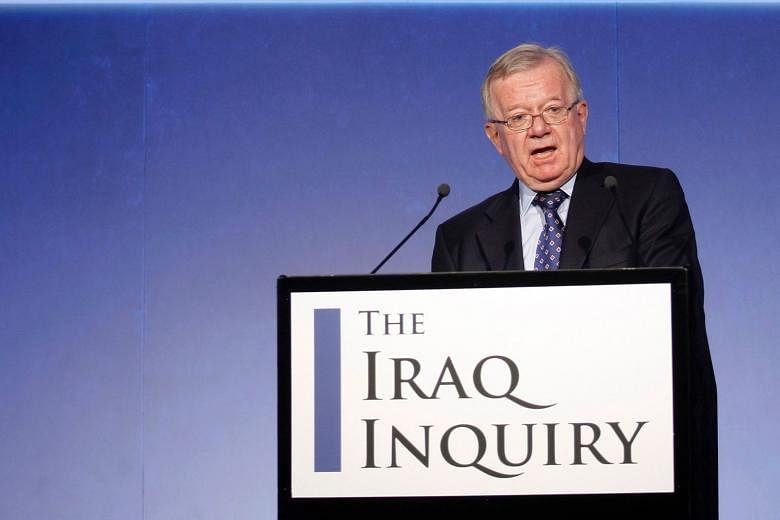LONDON • The findings of the official inquiry into Britain's role in the Iraq War will be out today.
The product of seven years of work, the report is likely to be the definitive assessment of a conflict that is widely seen in Britain as the worst foreign policy blunder since the 1956 Suez crisis.
Former prime minister Tony Blair is expected to face severe criticism.
The war claimed the lives of 179 British troops, more than 4,500 US service members and an untold number of Iraqi civilians; severely damaged the reputation of Mr Blair, who stepped down as prime minister in 2007; and continues to cast a shadow over Britain's relations with the United States.
Commonly known as the Chilcot inquiry, the investigation was launched in 2009 as British troops withdrew from Iraq, and was tasked with investigating the run-up to the 2003 US-led invasion and the subsequent occupation.
Key issues are expected to include intelligence failures, reliance by analysts on flawed sources of information about Saddam Hussein's weapons programme, and the use of that intelligence in going to war.
The report is also expected to look at how the military intervention itself was carried out, and the failure to plan for Iraq's future in the aftermath of the invasion.
More generally, the report will examine decision-making within the British government of the day.
There have been two previous official examinations of Britain's role in the war, both completed in 2004. But critics said those reports were too easy on the government and demanded a more thorough inquiry.
One report, led by senior judge Lord Hutton, stemmed from the 2003 death of an arms expert who privately alerted the BBC to his doubts about the reliability of the intelligence. The report blamed the broadcaster for sensationalising the expert's claims. The second inquiry, led by Lord Butler, a former civil servant, found failures in the gathering and use of intelligence, but cleared Mr Blair of manipulating evidence to build a case for war.
The latest investigation committee, led by retired civil servant John Chilcot, was authorised to thoroughly examine Britain's involvement in the Iraq War, "including the way decisions were made and actions taken, to establish as accurately and reliably as possible what happened, and to identify the lessons that can be learnt", as Mr Chilcot put it. He promised that it would "not shy away from making criticisms".
The inquiry, supposed to be concluded in a year, lasted longer than Britain's combat operations in Iraq, and cost around US$14 million (S$19 million).
Mr Chilcot has said he underestimated the time needed for the work, which involved a review of more than 150,000 documents and testimony from more than 150 witnesses. Significant witnesses were given the opportunity to respond to criticism. There were also protracted negotiations over the release of classified papers, including correspondence between Mr Blair and then President George W. Bush.
Mr Blair supported the Bush administration's assertions that Saddam had weapons of mass destruction. In an interview with CNN in October, he apologised for acting on what he described as faulty intelligence, acknowledging that the unending strife in Iraq contributed to the rise of the Islamic State in Iraq and Syria.
The report is unlikely to lead to charges against anyone but the committee says if it finds "that there were issues which could have been dealt with better, it will say so".
Lawyers representing relatives of 29 British troops who died say they will scrutinise the report for evidence of neglect of duty or misconduct in public office, which could form the basis of legal action .
NEW YORK TIMES, AGENCE FRANCE-PRESSE

